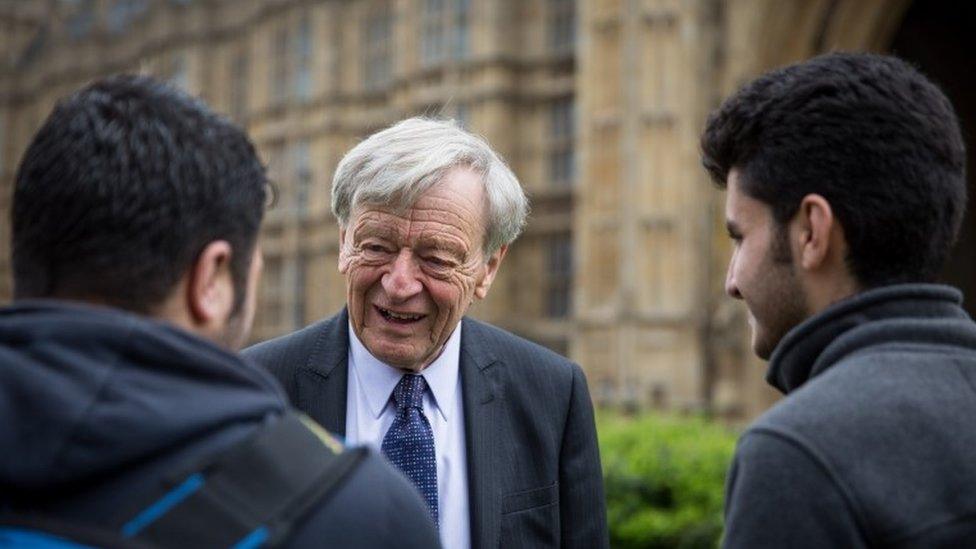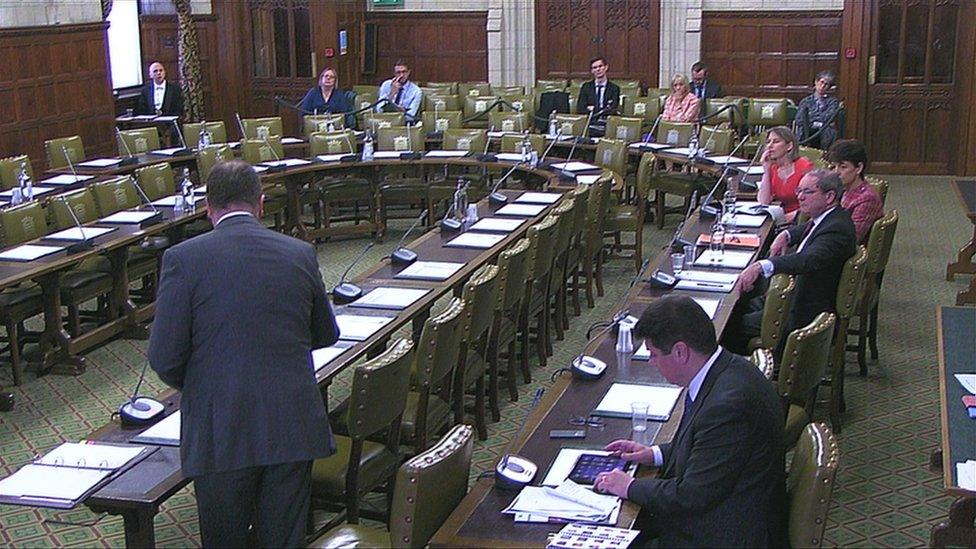Week ahead
- Published
- comments

Lord Dubs' amendment on child refugees will return to the Commons shortly
Should the UK admit unaccompanied child refuges from Europe, should the rules defining high income council tenants be changed, should trade unions face tougher controls on their elections and subscription-gathering?
Some major issues remain in play, as the work of Parliament continues to be dominated by the pinging and ponging of assorted bills between the Lords and Commons, as MPs tie up the legislative loose ends of the 2015-16 session.
In the last few days of this parliamentary year, peers, who have inflicted defeat after defeat on the government, on bill after bill, must decide whether to back down, accept concessions, or continue to resist the will of the Commons - and the action could well stretch into the following week.
The result is a rather fluid parliamentary timetable, with plenty of space kept available to deal with the latest rounds of ping-pong, as the two Houses seek agreement on the outstanding legislation.
Expect occasional bouts of ping-pong to be dropped into the agenda of either House at short notice. There's even talk of some early starts for MPs and peers the following week, if the ping-pong is still dragging on.
Something else to watch for is the start of a Commons "punch the bruise" strategy by pro-Leave backbenchers, to raise the issue of the cost of the EU - and the implications for bread and butter services like schools and hospitals - at every possible occasion. It will start at departmental question times, and in the next few weeks the aim is to raise the questions in debates in Westminster Hall and the Chamber, whenever they can.
Here's my rundown of what we know, so far, about next week's business, starting with the unsurprising fact that neither House will sit on Bank Holiday Monday.
Tuesday
The Commons opens at 2.30 pm with Business, Innovation and Skills questions - and 3.30pm will, as usual, be the likely moment for any ministerial statements or urgent questions.
Next on the agenda is a Ten Minute Rule Bill from the Green MP, Caroline Lucas. Her Transparency and Accountability (European Union) Bill aims to "establish an independent commission of inquiry to examine improving parliamentary and other public scrutiny of ministerial mandates and outcomes in relation to European Union institutions, policies and legislation". Essentially this is an attempt to set out a Green agenda for reform of the EU.
Then MPs give their reaction to Lords amendments to the Housing and Planning Bill, which might well take quite some time; there have been 13 outright government defeats on the bill - not to mention a number of equally significant concessions made by ministers to avert defeat.
One technical point is that this will be the first ping-pong vote held under the new English Votes for English Laws (EVEL) system, which will mean that, to be accepted, any Lords amendment will need a "double majority" of both all MPs present, and of MPs for English constituencies. This will be counted via iPads, so I hope the software works.
Beyond that, the political question now is whether the government will reject the lot, or seek some compromises. There's rumoured to be some wiggle room on the most sensitive political issues - the "pay to stay" provisions, which require people on higher incomes to pay higher rent, if they want to remain in social housing, and the plan to finance social housing tenants' right to buy, by selling off high value council properties.
But there are also issues in play on planning regulations and environmental standards for homes and drainage. There may be some interesting phone calls over the weekend.
There's a very topical debate first thing in Westminster Hall (9.30am-11am ) where the Conservative MP Nigel Mills will lead a discussion of the forthcoming Anti-Corruption Summit, which David Cameron will be hosting on 12 May. Mr Mills, a former tax advisor, is also the co-chair of the All Party Parliamentary Anti-Corruption Group, and was calling for a public register of companies using tax havens well before the emergence of the Panama Papers.

Debates in Westminster Hall include UK foreign policy in Libya and delays between death and burial, or cremation
Other subjects to be debated include the effect of UK foreign policy on Libya (11am-11.30am); asylum seeker dispersal policy - Rochdale MP Simon Danczuk is concerned that his constituency is seeing a disproportionate number of asylum seekers placed there, and will call for a more equal distribution (11.30am-1pm) and delays between death and burial or cremation (1pm-1.30pm).
In the Lords (2.30pm) the main debate is on issues faced by black and ethnic minorities in the workplace. But there's also the opening of nominations for the next Lord Speaker, following the decision of the incumbent, Lady D'Souza, to stand down in the summer. There's a debate on house governance issues in the Lords, the following week, which may provide a mini-hustings for the candidates.
Wednesday
The Commons opens (11.30am) with International Development questions, followed at noon by Prime Minister's questions. Then, Labour's Tom Blenkinsop has a Ten Minute Rule Bill to ensure terms and conditions for construction building 50mgwt power stations are protected - he says there are abuses on some sites.
The main debate will be on a Labour motion, to be announced, and there will also be a backbench debate on education funding in London.
Backbenchers outside London (mainly but not exclusively Conservatives) have waged a long and successful campaign to rebalance the funding formula for schools in England, which they have long argued are under-funded in comparison to schools in the capital. So successful have they been that London MPs have obtained a Backbench Business Committee debate on education funding in London, to air their anxieties that their schools stand to lose funding.
The day's Westminster Hall debates cover UK relations with the Gulf (9.30am-11am); and sentencing for knife crime (4pm-4.30pm) where the Conservative Will Quince will focus on stopping "soft sentences for people who commit a crime using a knife". He will call for stricter sentencing guidelines. Finally Daniel Kawczynski will lead a debate on Anglo-Russian relations (4.30pm-5.30pm).
In the Lords (at 3pm) the main event will be the next round of ping-pong on the Housing and Planning Bill. It is worth noting that the various government defeats on the bill were mostly by majorities of 50 votes or more - sometimes a lot more - and that some of those defeats took place after the dinner break, which is significant because peers often drift off at that point.
The fact that they didn't suggests they won't simply fold on all issues, at the first whiff of Commons grapeshot.
There will also be a debate on discussions with Disability Rights UK and Disability Benefits Consortium on identifying a mobility criterion in the Personal Independence Payment (PIP) led by the Lib Dem Baroness Thomas of Winchester.
Thursday
Commons opens (9.30am) with Environment, Food and Rural Affairs questions, followed by questions to the MPs who speak for the Church Commissioners, the Public Accounts Commission and the Speaker's Committee on the Electoral Commission. Then comes the weekly Business Statement from the Leader of the House, Chris Grayling.
The day's main debate - chosen by the Backbench Business Committee - is on the contribution of faith organisations to the voluntary sector in local communities from the Conservative Fiona Bruce and Labour's Stephen Timms. Fiona Bruce tells me the aim is to highlight the "very considerable contribution" by faith organisations in supporting the most vulnerable people and helping community cohesion.
In the Lords (from 11am) peers should quickly deal with the third reading of the Armed Forces Bill, where amendments are unlikely. Then, they turn to three drinking-related Statutory Instruments. First up, a motion to approve the Draft Licensing Act 2003 (Her Majesty The Queen's Birthday Licensing Hours) Order 2016, and then two SIs on different aspects of the Draft Pubs Code.
And there will also be a short debate examining the case for a new generation of polytechnics to address the technical skills gap.
Neither House sits on Friday.